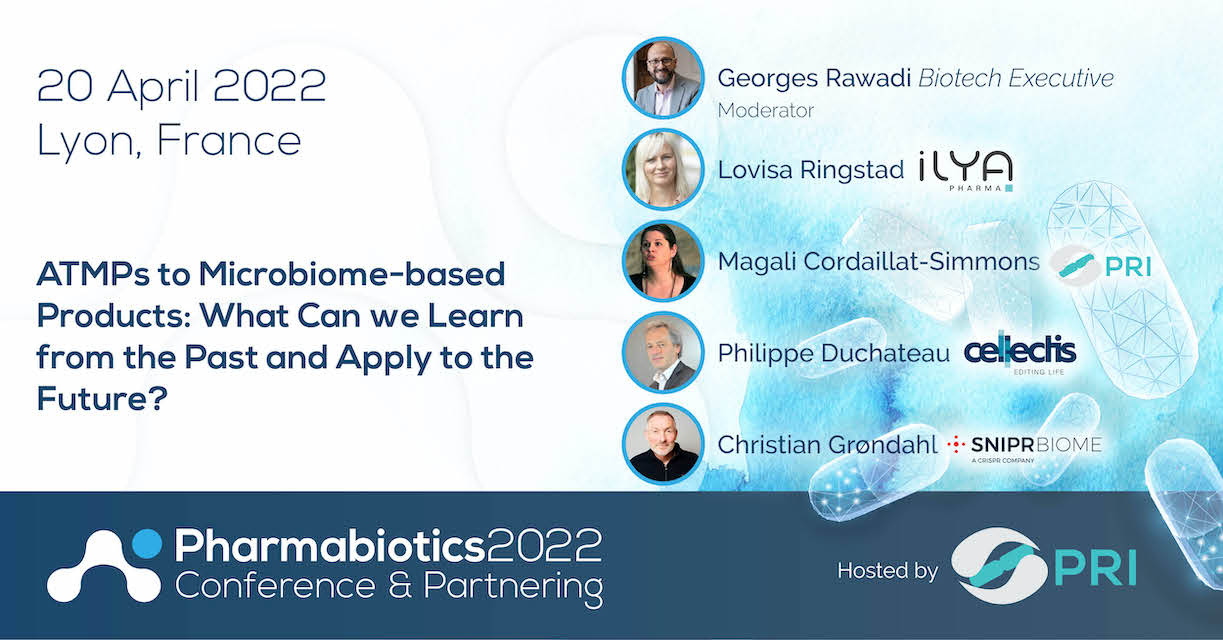
Upcoming panel at Pharmabiotics Conference & Partnering 2022 will explore what microbiome drug developers can learn from another area of pharmaceutical innovation
Live Biotherapeutic Products (LBPs) emerging from microbiome-related scientific innovation are novel and exciting drug candidates— and with novelty comes a high degree of uncertainty. Companies must make progress along an uncharted path of development, paving the way as they move ahead.
Although the microbiome is a unique field with specific challenges, other areas of innovation can provide inspiration for how to meet these challenges and successfully bring LBPs to market. Advanced therapy medicinal products, or ATMPs, are new medicines based on cells, tissues, or genes; the first successful ATMP was approved in 2009 in the European Union. Those who work in the field of ATMPs and who helped bring these therapeutics to market in previous decades have experiences that may be applicable to the present-day microbiome field as the first LBP candidates get closer to market approval.
The opening panel of the Pharmabiotics conference in April 2022 in Lyon, France, will bring together experts from microbiome and ATMP drug development to explore what microbiome drug developers can learn about navigating the scientific and regulatory challenges they currently face.
The panel, to be held on April 20th, is called “ATMPs to Microbiome-based Products: What can we learn from the past and apply to the future?”

Moderator Georges Rawadi will lead a conversation by a panel of experts from across ATMP and microbiome drug development:
-
Lovisa Ringstad of Ilya Pharma AB
-
Magali Cordaillat-Simmons of PRI
-
Philippe Duchateau of Cellectis; and
-
Christian Grøndahl of SNIPR Biome.
Rawadi, a scientist and pharmaceutical executive who has worked with both ATMP- and LBP-focused teams, says,
“Companies developing ATMPs have faced the same questions microbiome companies are facing now: how can we de-risk technologies? How can we strategically navigate through the unknown CMC, regulatory, and clinical environment to advance toward our goals?”
Grøndahl previously worked in antibodies and gene therapies before becoming co-Founder and CEO of SNIPR Biome, a CRISPR technology and microbiome-focused drug company. He says,
“Every new field goes through successes and disappointments before reaching a stage of stability and growth. Ultimately we all want to achieve safe and efficacious delivery of a drug product, but first we need to reduce the number of questions so unknowns are not overwhelming.”
Rawadi adds that microbiome drug developers should keep realistic timelines in mind. “For instance, antibody technology took 20-30 years until the first product was approved for the market. In the microbiome, we are approaching toward 20th year of research, and development so this may be the time frame when we need to see meaningful progress.”
Ringstad currently has a role as Head of CMC and has worked for institutes, academia, and industry, says many companies experience practical challenges when it comes to manufacturing and quality control.
“For new therapies it can be difficult to find a manufacturer that can do what you want,” she says. “Companies should consider the pros and cons of manufacturing on their own – realizing that whether you manufacture on your own or use a contract manufacturing organization, you need in-house expertise to have it proceed properly.”
Partnerships are important, notes Philippe Duchateau, CSO at Cellectis—a clinical-stage biotech using a gene-editing platform to develop life-saving cell and gene therapies.
“Early-stage companies usually have limited resources while under high pressure to demonstrate efficacy of their product, particularly in an emerging field such as the microbiome,”
he says.
“These companies should consider building a strong partnership with a key player in their field. This is a very important step for small companies as it is a real recognition of the value of their innovative approach and may give them access to missing technological capacities, expertise, and resources. Besides prospective revenues, it holds the potential to fuel and accelerate the development of their products.”
Another critical component of success for LBP developers are the regulatory frameworks, which will be addressed on the panel by Cordaillat-Simmons, Scientific & Regulatory Affairs Director at PRI.
“By definition, innovation is ahead of regulatory evolution,” she says. “The current lack of clear guidelines for microbiome-based products should not be feared. In fact, this situation leaves room for a science-driven and risk-analysis-based approach, which stays focused on the individual products rather than on ‘ticking boxes’. The latter is a more rigid approach that is not always relevant for complex products, and may in fact delay bringing these products to market.”
The panelists also say microbiome companies must adapt to a macroeconomic situation that has already shifted in 2022. The current environment may cause investors to be more cautious when it comes to LBP investment, especially given the complexity of the microbiome. Grøndahl says,
“In times like this, the biotechs that will survive are the prudent ones. They design small and short studies to advance to the next stage of development. Once they have some good data, they can dream a little bigger.”
Rawadi believes conference participants in the microbiome field will walk away from the panel with some practical advice for tackling their most pressing challenges.
“We can learn a lot from other areas of biological drug development that have faced similar challenges,” he says. “While we may not find a roadmap, at least we can gain information on how to navigate the uncertainty.”
To hear the panel discussion, as well as other discussions around the latest science and technological innovations in developing microbiome-based drug products, register for the Pharmabiotics conference here: https://www.pharmabioticsevent.com

